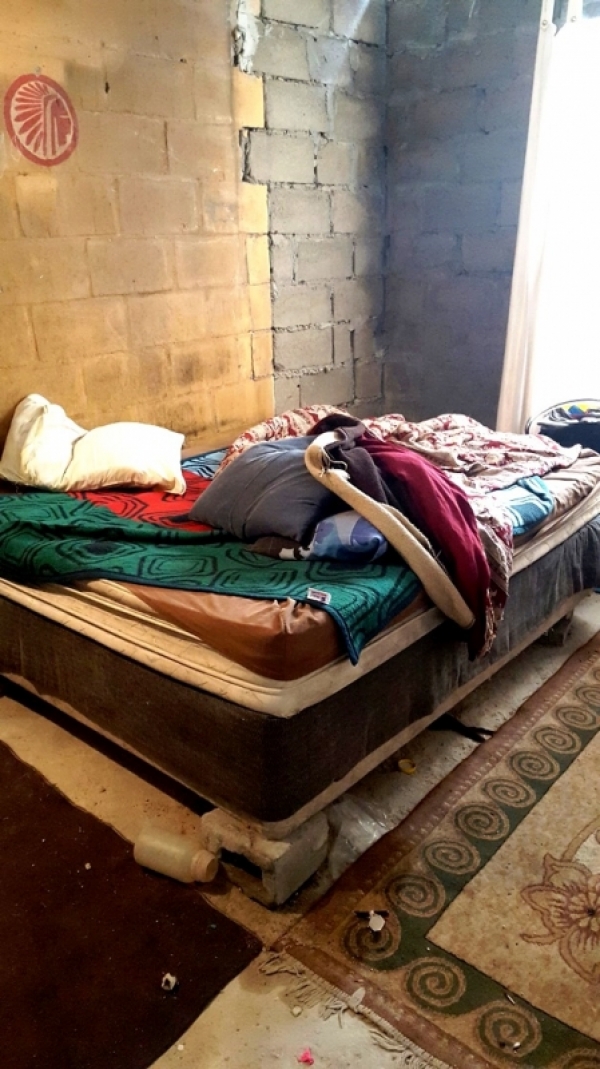Mother of two disabled children barely coping

Nomahlubi Mbulu is 47. She lives in a house in Old Crossroads. She has three children, a 12-year-old girl, a 17-year-old daughter and a 20-year-old son. Her last born, Lilitha, and her eldest, Sibusiso, are both disabled. She is struggling to cope.
Sibusiso lives immobilised in a dilapidated wheelchair. He moves his head, but little else. He cannot even chew.
“God must either take me or just take all of us, because I cannot take it anymore. I don’t know what to do anymore,” says Mbulu.

Twenty-year-old Sibusiso Mbulu is severely disabled. Photo by Mary-Anne Gontsana.
“I got Sibusiso in September 1995, he was healthy and there was nothing wrong with him. Then, when he was eight months, he started having fits. I rushed him to Red Cross Children’s Hospital. He was admitted and the first diagnosis said that he suffered from epilepsy.
After more tests, she says the doctors discovered he had “hair growing in his system”. He underwent a series of operations. At one stage, he had to eat through a pipe for nine months. His condition deteriorated.
“As you see him now, he cannot do anything for himself,” says a distraught Mbulu. “He cannot even remove a fly that sits on him. He cannot stretch. I have to lay him on the bed and wipe him because I cannot wash him … He gets bedsores. He only eats baby food because he cannot chew, and he wears nappies.”
Mbulu went for a tubal ligation (sterilisation) after her second born. She wanted to give Sibusiso more attention. She knew she could not handle more children. But in 2003 she “got the shock of her life”. At a routine check-up at a clinic, she was told that she was five months pregnant.
“I was hysterical, because I didn’t even have any symptoms which would make me think that I was pregnant … I told them that I wanted to have an abortion, because I had a disabled child … I was told I was too far along … I was just told that I had to deal with it because it was a blessing from God and I could get a social grant to take care of the child.”

Lilitha Mbulu, 12, was diagnosed with epilepsy and autism. Photo by Mary-Anne Gontsana.
After she gave birth to Lilitha, she says that “it was like I was dreaming when the exact same thing that happened to Sibusiso, happened to her”. Lilitha started getting fits at eight months.
She was also diagnosed with epilepsy, and later on, autism. Lilitha’s condition was very severe; she was a danger to herself.
“She pulls out her hair; she plucks out her eyelashes; she pulls and twists her tongue … She strips off her clothes and her nappy. Just a couple of days ago, she took of her nappy and smeared her poo all over the house … She drinks dirty water. She eats anything and everything that she can get her hands on … She hurts herself constantly.
“Both Sibusiso and her have fits every single day. It’s so hard to deal with it. When they get their episodes, there’s nothing I can do … It is the most scariest thing,” says Mbulu.
The house is spacious, but it has broken cement floors, unfinished damp walls, a room with no windows and two beds that have springs sticking out of the mattresses. All the doors are fitted with bolts; the television and DVD player are placed high up on a makeshift wooden stand, and the small kitchen is cordoned off with wooden fencing to stop Lilitha from entering. There is an outside toilet next to the kitchen.
Mbulu, who is divorced, said the father of the children did nothing to help. He is unemployed. He never visits or takes any interest in their well-being.
She says she has exhausted every avenue of help for her children. She survives on the R1,410 disability grant for two of her children and a R320 child grant for the middle child. Her dream is to get them into a home with professional care.
“I have spoken to social workers. I even went to Gugulethu where there was an event held at the sports complex, because I had heard that Bathabile Dlamini, the minister for social development, would be there. I took my children there and right enough she saw us. I was told that something would be done.
“A few days later, social workers came to me saying they were sent to assess the situation. After that, nothing happened.”
Mbulu has been diagnosed with depression for which she gets medication at Lentegeur. Limping as she walks, with tears in her eyes, she says she does not know what she has done to deserve such a life.

Nomahlubi Mbulu is a single mother of two disabled children and she says she is struggling to take care of them. Photo by Mary-Anne Gontsana.
Support independent journalism
Donate using Payfast

Don't miss out on the latest news
We respect your privacy, and promise we won't spam you.
Next: Unhappiness with electricity costs ignites protests in Pietermaritzburg
Previous: Dispute over jobs sparks protest in Barcelona informal settlement

This article is licensed under a Creative Commons Attribution-NoDerivatives 4.0 International License.
